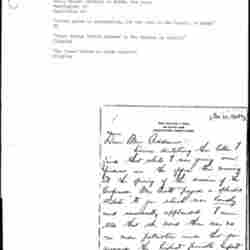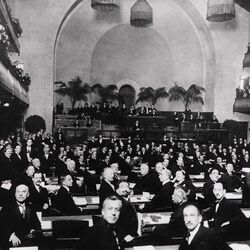WAR CAUSE TRACED TO TRADE FACTORS
Desire to Guard Wealth Put Before Women as Breeder of Conflicts.
Economic conditions, the desire to retain established wealth, and the fear that other powers may extend political control over treasured natural resources were laid before the National Conference on the Cause and Cure of War today at the Washington Hotel as among the most fruitful causes of international conflict.
Speakers presenting these "causes" to the conference, which will later hear proposed "cures" and then endeavor to work out a general program of action for national women's organizations, were John Foster Dulles, New York lawyer and former member of the Preparations Commission and the Supreme Economic Council, and William Smith Culbertson of the United States Tariff Commission.
"I believe history confirms the view," said Mr. Dulles, "that the principal economic cause of war is not a greed for gain, but, rather, the effort to avoid change and to maintain existing conditions. War is due to fear -- fear for the loss of property which has been honestly acquired and which, with society organized on a capitalistic basis, it is lawful to seek to retain."
Struggle Against Change.
Certain classes of men in the development of nations, Mr. Dulles said, had come to "a pinnacle of power and influence," and then found that the same conditions which brought them to such positions "begin to alter, and these individuals are the source of their strength and power beginning to shift from beneath them. Given such a situation, they inevitably struggle against it and lay hold of whatever means may be at hand."
Such forces operated in Austro-Hungary and in Russia, Mr. Dulles believed, in the case of the World War. "The ultimatum to Serbia, the quick mobilization of Russia," he said, "were natural reactions of governments of such a character."
Great Britain, according to the speaker, "is menaced in its general economic strength by the vast changes which have been brought by war." These changes, he explained, were taking place in the textile and metallurgical [fields], threatening the principal industries of England.
Views on Egyptian Crisis.
"So when we see the British government," he explained, "including in its demands upon Egypt the right to utilize freely the waters of the Nile to irrigate the cotton development of the Sudan that is but one manifestation of the efforts of the textile industry to ward off danger. Thus while the demand of Great Britain upon Egypt is, in a superficial sense, aggressive and grasping in character, yet in reality the motive behind it is less the desire to extend and increase wealth and power than the determination to maintain an established industry which is seriously menaced."
Mr. Culbertson, who spoke on "Raw Materials, Markets and War," declared the raw materials of the world should be opened to all peoples equally as a step in removing one of the primary causes of conflict.
"Rivalry among nations or among national groups frequently gives rise to serious complications in international affairs," Mr. Culbertson said. "A nation powerful in industry, commerce, finance and defense would appear to be secure. But practically this has not proved true. Evidently permanent international security cannot be sought in temporary expedients like armaments. Rather is there needed a set of firmly established principles to regulate the fundamental economic relations of states. Commercial security will be obtained only by offering similar security and certainty to other states."
Take Up "Cures" Next.
Mrs. E. H. Silverthorn, president of the Federation of Woman's Boards of Foreign Missions of North America, presided at this morning's sessions.
The program this evening will be given over to an "open forum on the cause of war," concluding the [first] half of the conference program. Tomorrow the program will take up the cures of war. Miss Julia Lathrop will preside at this evening's session to open at [8:15] o'clock.
Gen. Allen Speaks.
Maj. Gen. Henry T. Allen, retired, discussing America's attitude toward armament, at last night's meeting, asserted that "no great state has evinced keener interest and a stronger desire to see effected general reductions of armament and judicial settlements of international disputes than the Untied States." It was his hope, he said, that after further study the Geneva protocol for disarmament might result in a conference in which the United States will participate to outlaw war, radically reduce armaments and afford security to the peoples of the earth.
Fear and insecurity, stressed frequently by speakers during the day as a major factor in causing wars, was again emphasized last night by James G. McDonald, chairman of the executive committee of the Foreign Policy Association, in an address on "Competition in Armaments." He attributed Europe's piling up of armaments to an "all-prevailing fear," lack of which in the United States explained the difference in policy. Only through such organization as the League of Nations, he asserted, "can there be hope that war will be averted."
Urges Birth Control.
Equalization of "population pressure" through birth control was advocated by Prof. Warren Thompson of Miami University, Oxford, Ohio. He also urged abolition of all barriers that prevent free access to the world's resources, of all customs bars and of those against migration. Birth control, he said, "is no more immoral than war, and we have to choose between them," since overpopulation is a contributory cause of war.
Pierrepont Noyes, Oneida, N.Y., business man and former commissioner on the Rhine, described "fear of another man's fear" as a new passion that has arisen to be dealt with in a peace program. Prof. Edward M. Earle of Columbia University also addressed the conference last night on "Imperialism, Territorial and Economic."
















Comments